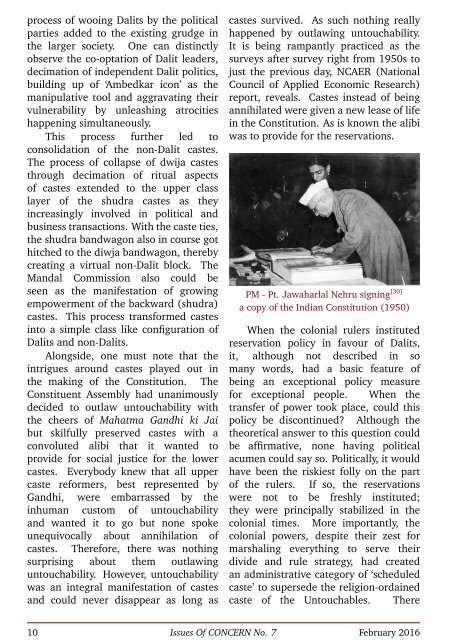ISSUES OF CONCERN
Issues_of_Concern_February_2016
Issues_of_Concern_February_2016
You also want an ePaper? Increase the reach of your titles
YUMPU automatically turns print PDFs into web optimized ePapers that Google loves.
process of wooing Dalits by the political<br />
parties added to the existing grudge in<br />
the larger society. One can distinctly<br />
observe the co-optation of Dalit leaders,<br />
decimation of independent Dalit politics,<br />
building up of ‘Ambedkar icon’ as the<br />
manipulative tool and aggravating their<br />
vulnerability by unleashing atrocities<br />
happening simultaneously.<br />
This process further led to<br />
consolidation of the non-Dalit castes.<br />
The process of collapse of dwija castes<br />
through decimation of ritual aspects<br />
of castes extended to the upper class<br />
layer of the shudra castes as they<br />
increasingly involved in political and<br />
business transactions. With the caste ties,<br />
the shudra bandwagon also in course got<br />
hitched to the diwja bandwagon, thereby<br />
creating a virtual non-Dalit block. The<br />
Mandal Commission also could be<br />
seen as the manifestation of growing<br />
empowerment of the backward (shudra)<br />
castes. This process transformed castes<br />
into a simple class like configuration of<br />
Dalits and non-Dalits.<br />
Alongside, one must note that the<br />
intrigues around castes played out in<br />
the making of the Constitution. The<br />
Constituent Assembly had unanimously<br />
decided to outlaw untouchability with<br />
the cheers of Mahatma Gandhi ki Jai<br />
but skilfully preserved castes with a<br />
convoluted alibi that it wanted to<br />
provide for social justice for the lower<br />
castes. Everybody knew that all upper<br />
caste reformers, best represented by<br />
Gandhi, were embarrassed by the<br />
inhuman custom of untouchability<br />
and wanted it to go but none spoke<br />
unequivocally about annihilation of<br />
castes. Therefore, there was nothing<br />
surprising about them outlawing<br />
untouchability. However, untouchability<br />
was an integral manifestation of castes<br />
and could never disappear as long as<br />
castes survived. As such nothing really<br />
happened by outlawing untouchability.<br />
It is being rampantly practiced as the<br />
surveys after survey right from 1950s to<br />
just the previous day, NCAER (National<br />
Council of Applied Economic Research)<br />
report, reveals. Castes instead of being<br />
annihilated were given a new lease of life<br />
in the Constitution. As is known the alibi<br />
was to provide for the reservations.<br />
PM - Pt. Jawaharlal Nehru signing [30]<br />
a copy of the Indian Constitution (1950)<br />
When the colonial rulers instituted<br />
reservation policy in favour of Dalits,<br />
it, although not described in so<br />
many words, had a basic feature of<br />
being an exceptional policy measure<br />
for exceptional people. When the<br />
transfer of power took place, could this<br />
policy be discontinued? Although the<br />
theoretical answer to this question could<br />
be affirmative, none having political<br />
acumen could say so. Politically, it would<br />
have been the riskiest folly on the part<br />
of the rulers. If so, the reservations<br />
were not to be freshly instituted;<br />
they were principally stabilized in the<br />
colonial times. More importantly, the<br />
colonial powers, despite their zest for<br />
marshaling everything to serve their<br />
divide and rule strategy, had created<br />
an administrative category of ‘scheduled<br />
caste’ to supersede the religion-ordained<br />
caste of the Untouchables. There<br />
10 Issues Of <strong>CONCERN</strong> No. 7 February 2016


